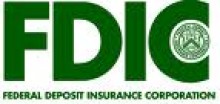FDIC Insurance Fund Still $20 Billion in the Hole
While the stock market was beginning its 376 point plunge yesterday, the Federal Deposit Insurance Corporation was quietly putting the best face it could on a banking system in serious trouble. In a press release to update the status of the insurance fund, the big positive headline was, “FDIC-Insured Institutions Earned $18 Billion in the First Quarter of 2010–Net Income Highest in Two Years.” FDIC Chairman Sheila C. Bair said, “There are encouraging signs in the first-quarter numbers . . . Industry earnings are up. More banks reported higher earnings, and fewer lost money.” (Click here for the complete FDIC press release.)
I can appreciate Chairman Bair’s positive attitude, but “encouraging signs” do not mean we have turned the corner and brighter days are ahead. The Deposit Insurance Fund, or DIF, has a negative balance of -$20.7 billion. That is just a $200 million improvement from the all time record deficit of -$20.9 billion at the end of 2009. I don’t see how these numbers are “encouraging.”
I talked with FDIC spokesman David Barr yesterday about the shortfall in the DIF. He said, “The FDIC is not broke.” It has an additional “$63 billion in cash.” He told me there is about $46 billion in three years of prepaid deposit insurance premiums and an additional $17 billion in cash for a grand total of $63 billion in “liquid resources” to close insolvent banks. Let me get this straight–nearly 75% of the FDIC’s bailout money is from fees collected up front. What happens when the FDIC burns through that? Will they collect another 3 years of fees?
Barr told me the FDIC is expecting to spend “$40 billion” closing troubled banks in the next 12 months. He said, “It could be less and it could be more.” Simple math says it will be more, way more. There have already been 72 failed banks so far this year. According to Barr, at the same time last year, there were only 33 failed banks. In 2009, there were 140 total banks closed. Bar freely admitted, “The pace (of bank closings) is greater this year.” Barr expects more banks to fail in 2010 than 2009, but he would not give a number. He said, “We don’t provide numbers because to us it’s not the numbers, it’s the cost.” The latest list of “problem” banks from the FDIC now stands at 775. 73 banks were added to the list since the end of 2009. That is nearly a 10% increase in less than 5 months.
Reggie Middleton is an investor and analyst who owns BoomBustBlog.com. He was one of the earliest to warn of the impending downfall of Lehman Brothers and Bear Stearns. Middleton told me, “If the FDIC had more money and manpower, it would be closing a lot more banks.” Middleton also said, “Many of America’s 8,000 banks are insolvent or close to it because of mark to market accounting.” Because of accounting rule changes, banks are allowed to value toxic assets for whatever they think they are worth, not what they actually are worth. Some call this “mark to fantasy accounting.” Middleton warns, “There is more risk now (in the banking system) than during the Lehman crisis because the pool of banks is smaller.”
When I look at residential and commercial real estate, I see no “encouraging signs.” I see frightening headlines like the one that came out just this week that says, “One in 7 U.S. homeowners paying late or in foreclosure.” (Click here for the full story) Commercial real estate doesn’t look any better. Some experts are forecasting $1 trillion in CRE losses before the banking crisis is finished. The FDIC is acting more like the Resolution Trust Corporation of the early 90’s than a deposit insurance fund. Let’s hope it does not run out of money anytime soon.













Greg, Thanks for pointing out that FDIC insurance may get you an IOU instead of cash. Once again, I predict the ObamaChrist saving the American people by the CONFISCATION of all of the peoples 401-K’s, MoneyMarket Accounts, CD’s and IRAs. The government is spending trillions. Yesterday the market sagged and the main stream media stated people were fleeing to “quality”, meaning US Treasuries. If that is quality, what would crap look like? We have spent and obligated ourselves for more than we can ever pay and instead of trying to stem the tide of red ink; Congress is spending like a drunken sailor.
George,
At least sailors spend their own money. Thank man!
Greg
Hello Greg,
Another good article. Everyday I gain evidence that our “recovery” is built on a “house-of-cards.” Some Lowe’s stores are suffering through more soft sales cycles. Unemployment numbers took a bad turn.
Dr. Walter Williams said on Suss’ show that it is prudent to have some gold stashed as there is a chance that things could go sideways. I am adding an additional item to that list–a handgun!
If you don’t have gun experience, purchase a revolver as they are “inherently” safe. Take it to the range and shoot 500 rounds through it over a two month period. Get comfortable with it.
Gold, guns, and MREs may be become survival tools. I give a 5% chance that unrest may occur in the next two years.
markm
Mark,
It is better to have something and not need it than need it and not have it. You are doing the prudent thing. What is happening today has never happened before. So who know’s how this will shake out. Thank you for your support and the info.
Greg
“We don’t provide numbers because to us it’s not the numbers, it’s the cost,”-FDIC spokesman.
Hahaha! Yeah, because it’s a whole lot easier to “massage” the cost.
Paul,
Good point.
Greg
Ahhhh the smell of ignorance….I honestly think you could show the american public this ticking bomb and they would still ignore it because the fuse still has a few days left to burn….how is it that its perfectly legal to run all kinds of staggering debt yet nobody gets punished, or at least called out for being an a+ criminal politician or lawmaker….I guess money really is the root of all evil, and since politics=money I think y’all can see where I’m going with this….
BLT,
I keep wondering how much longer this can go on without another serious meltdown. We will see.
Greg
BLT wrote,
“….I guess money really is the root of all evil, and since politics=money I think y’all can see where I’m going with this…”
Money is not the root of all evil. Money is simply, an easier way to trade YOUR labor for goods that you need or want. Increasing your bartering capability by increasing the value of your labor is not evil. Also, putting your assets to work is not evil.
I am hoping that your statement was a sarcastic thought.
Your point about the ticking time-bomb is ritht-on. I have a co-worker who orders his life around his fears. He sold stocks last week while the market was tanking. He bought those stocks while the market was rising. He wants gubmint to strictly regulate the market so that he can have a steady rate-of-return (Ha-Ha–yea, that will work!). I classify this guy as “lacking brain matter.”
markm
BLT is right. What I keep hearing from workers, not business owners, is that everything is alright. We’ll be fine in a year or two.
They say they’ve lived through this before in ’82, ’87, and ’91.
When I try to explain this is different they say that is what people said then.
Ah, if I am right about what is going to happen they will be a lot of people crying, and as you know. Then there will be the bottom.
I still don’t see how the US can dance out of this in less then 10 or twenty years. My basis is on the Japanese experience.
My question is; which is better? Discipline of diversity?
Interesting times these are.
Good job! Keep your work!trend internet security